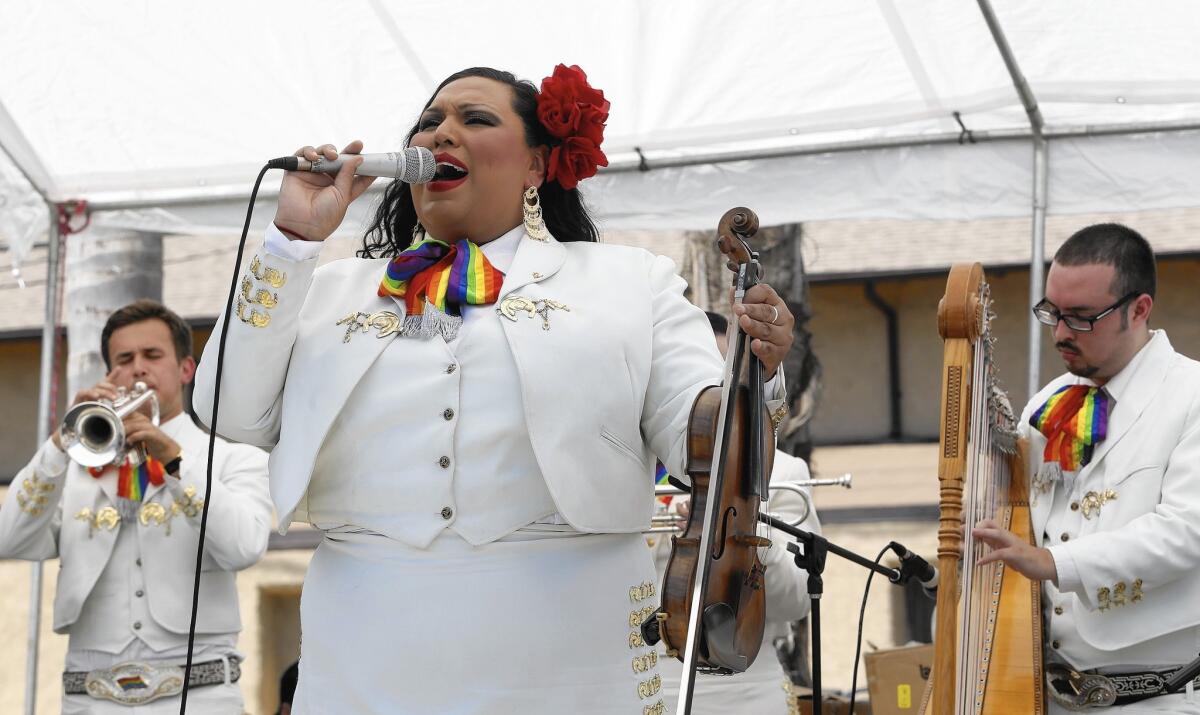For LGBT mariachi band, the music is free of machismo

The man and woman in the audience were sitting cozy, his arm draped around her shoulder, when the mariachi singer began serenading them with Juan Gabriel’s “Inocente Pobre Amigo.”
Lo que pasa es que no quiero mas problemas con tu amor.
The thing is, I don’t want more problems with your love, Carlos Samaniego crooned. The man grinned and pointed at himself, realization setting in: Samaniego was serenading him, not the woman.
Samaniego, singing at a recent Pasadena church fellowship, teased: “This song is dedicated to all of our brothers and sisters who are still in the closet.”
Samaniego is the director and founder of Mariachi Arcoiris de Los Angeles (Rainbow Mariachi), which bills itself as the world’s first LGBT mariachi band. During the Pasadena show, as with all performances, Samaniego motioned toward violinist Natalia Melendez, introducing her as “the first transgender woman in mariachi.”
“She’s making history!” he shouted.
Theirs is a music genre dominated by machismo, by straight men in flashy charro suits and sombreros singing songs of love and lust about women. Mariachi Arcoiris, Samaniego says, is out to challenge that.
“When I came out, other musicians, the total machos, would tell me I wasn’t good enough to represent this music,” Samaniego said. “I wanted to create a haven for people who identified as LGBT in the mariachi world to play the music we love and not be made fun of, not be talked down to because of how they look, how they act, who they go to bed with.”
As a child, Samaniego idolized female performers, singing along with Rocío Dúrcal, not Juan Gabriel, when he heard their duet “Dejame Vivir.” He joined his first mariachi at El Sereno Middle School in the 1990s. He was a skinny kid who played the guittarón — the big, deep-bodied bass guitar — and he eventually learned the violin. Melendez, who was assigned male at birth and transitioned a few years ago, has been playing violin since she was 8.
The two met as teens in an after-school mariachi band. Samaniego hadn’t yet come out, and Melendez identified as a gay male. Eating breakfast together on a recent morning, they recalled growing up, both passionate about the music.
“When Natalia and I were growing up, there was nobody who we could look up to and say they’re doing the work we want to do,” Samaniego said. “It made it that much difficult for me to come out and for Natalia to be who she was.”
Melendez smiled at her longtime friend.
“I tried to kick him out of the closet,” she said. “And now he’s just glitter everywhere, rainbows and everything, taking over Los Angeles with his mariachi.”
Samaniego said he came out as a music student at Cal State Los Angeles in the early 2000s and joined a campus LGBT activism group that, in protest, planned a mock same-sex wedding. They planned to order a cake, decorate and have volunteers say vows. But if it was going to be “a total, typical Mexican wedding,” Samaniego said, it needed a mariachi. Even better, someone suggested, an all-gay mariachi.
He called on friends and friends-of-friends from across the state, as well as Melendez, for the first iteration of Mariachi Arcoiris. The band was a hit and even landed a club gig, but it didn’t last long, Samaniego said, because he was young and inexperienced as a director. But the idea never left.
In 2014, the legendary norteño band Los Tigres del Norte made a splash with a new song, “Era Diferente,” about a lesbian teenager in love with her best friend. Singer and accordion player Jorge Hernandez, who wrote it, told the Advocate magazine it was the first song about same-sex love in the history of the genre and that he wrote it after gay fans asked why the band didn’t sing about them.
Asked if he knew any gay norteño singers: “I don’t know of anyone,” he told the magazine.
The emergence of Mariachi Arcoiris is not just a innovation in traditional Mexican music but “an important social innovation, too” said Daniel Sheehy, curator and director of Smithsonian Folkways Recordings and author of “Mariachi Music in America.” Sheehy likened the group’s importance to that of trailblazing violinist Rebecca Gonzales, who helped crack open the male mariachi scene for women in 1975 when she joined Los Angeles’ high-profile — and all male — Mariachi Los Camperos de Nati Cano.
“With Mariachi Arcoiris, their story is still to be told, and their story is bound to have some impact on the overall appreciation of how mariachi music fits into our society and who is part of that culture,” Sheehy said.
Although attitudes are changing, Samaniego and Melendez both have had their share of put-downs and have lost gigs because of their identities. The mariachi world is small and well-connected, Samaniego said, and many musicians are “very traditional, very Catholic and from small towns in Mexico,” he said.
“It’s not that I’m saying, ‘Hello, nice to meet you. I’m gay.’ But if you ask me, I’ll tell you,” Samaniego said.
Often, when he’d perform with groups, he’d make friends with American-born musicians, but others avoided him, using a thinly veiled code, saying it was because he was “American.”
Melendez stopped getting job callbacks once she began her gender transition about five years ago. Family and friends worried about her safety — including Samaniego, at first — and told her she’d have to choose between transitioning and performing.
As a performer, the transition would be public. She had to practice consciously speaking and singing in a higher pitch because her voice didn’t change. And as her hair grew and her face softened, she saw the stares.
“It’s rough. It’s people looking at you, you looking like an oddity, asking, ‘What are you? A boy or a girl?’” she said.
The freelance calls decreased. Once, a friend and fellow musician she and Samaniego grew up with needed a female musician for a gig and Samaniego suggested Melendez. The friend said he couldn’t hire her because the “clients would be uncomfortable.”
Even as Mariachi Arcoiris has gained attention and landed media interviews, producers and reporters ask Melendez prying, personal questions about her body and transition.
But she tries not to think about those things: “I do this for me.”
On a recent, sweltering Sunday night, Mariachi Arcoiris was crammed into a tiny dressing room at Club Tempo, a Hollywood club that caters to gay Latino cowboys, where it performs weekly.
“Again, please. Again, again,” Samaniego repeated as they practiced, intoning a violin riff.
His musicians, wearing rainbow-colored moños, were exhausted: the day before, they had performed in punishing heat at Oceanside’s Pride by the Beach, their van overheating and dying numerous times on the drive.
But Samaniego expects the best. He’s told his musicians that because of the nature of the group, they’re going to be scrutinized, so they have to perform very well.
“One thing I don’t want people to say is that we play badly,” he said. “We need to sound good all the time, and when people make mistakes, I bark at them. I want ... to do big shows, big theaters. We don’t want to limit ourselves.”
The band members weaved their way through a crowd of men in cowboy hats and polished, pointed boots, and the show began at 7:30 sharp. The men in the crowd, some of them holding each other close, sang along, knowing all the words, lifting their beers and swaying to the music.
As trumpeter Ruby Gutierrez sang “La Feria de las Flores,” a woman in a collared shirt and vest walked up and grinned shyly, tucking a dollar into Gutierrez’s blouse as the people at her table clapped. She couldn’t stop smiling as she walked back.
Often, gay people in the crowd get emotional having a same-sex person in a mariachi sing to them because it never happens, Samaniego said. And for him, he sings more passionately to men because the lyrics are true.
At the Pasadena church performance days later, Samaniego belted out a song, in English, that he dedicated to the LGBT community: Frank Sinatra’s “My Way.”
I faced it all, and I stood tall — and did it my way.
In the audience, Mario Garcia of Altadena called for an encore. He was impressed, and he didn’t care that it was an LGBT group.
“They were great,” he said. “Music is music.”
Twitter: @haileybranson
ALSO
Poland won’t extradite Roman Polanski to the U.S.
Decades later, Dave’s still not here: A conversation with Tommy Chong
Air Force hires civilian drone pilots for combat patrols
More to Read
Sign up for Essential California
The most important California stories and recommendations in your inbox every morning.
You may occasionally receive promotional content from the Los Angeles Times.











